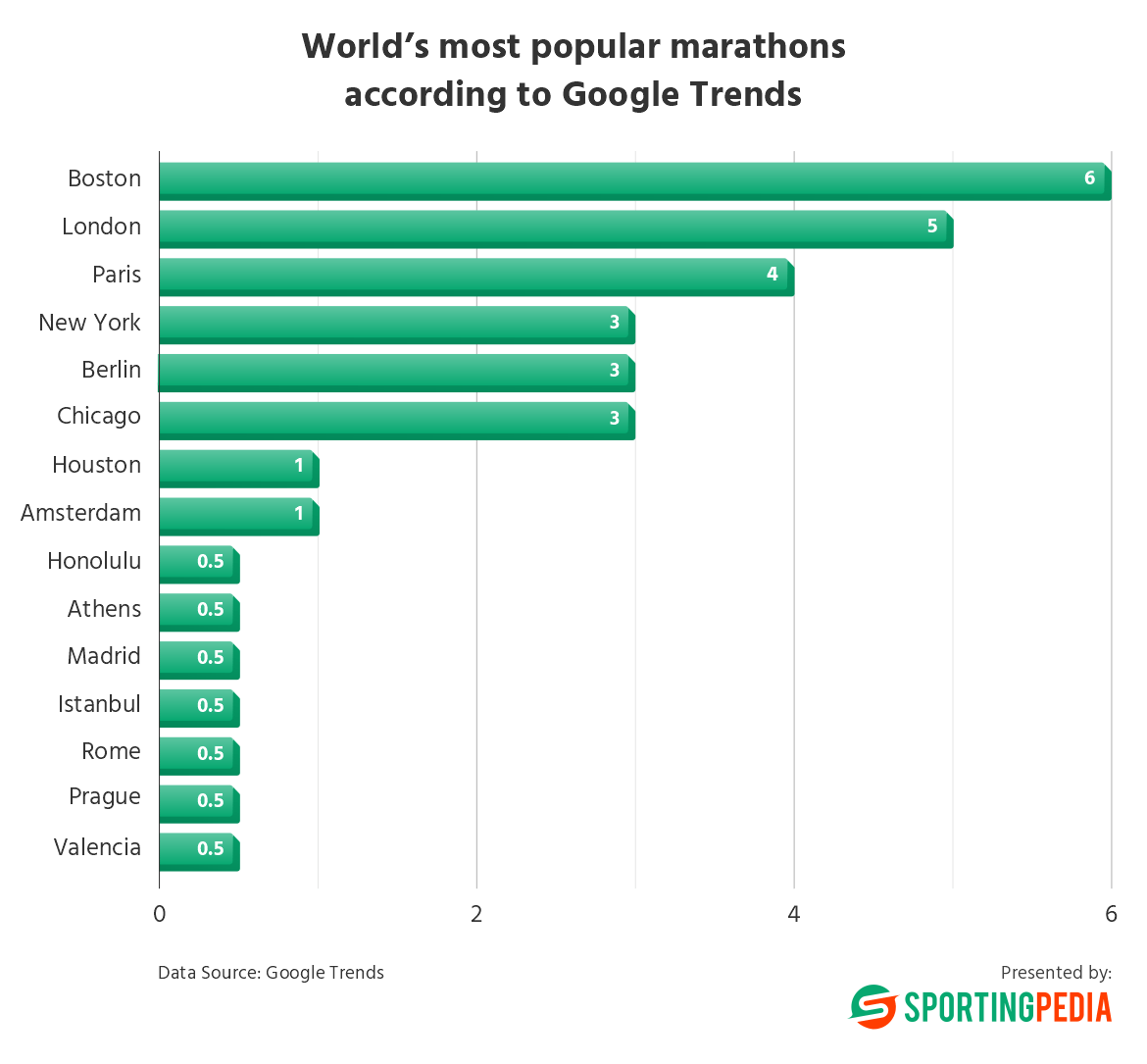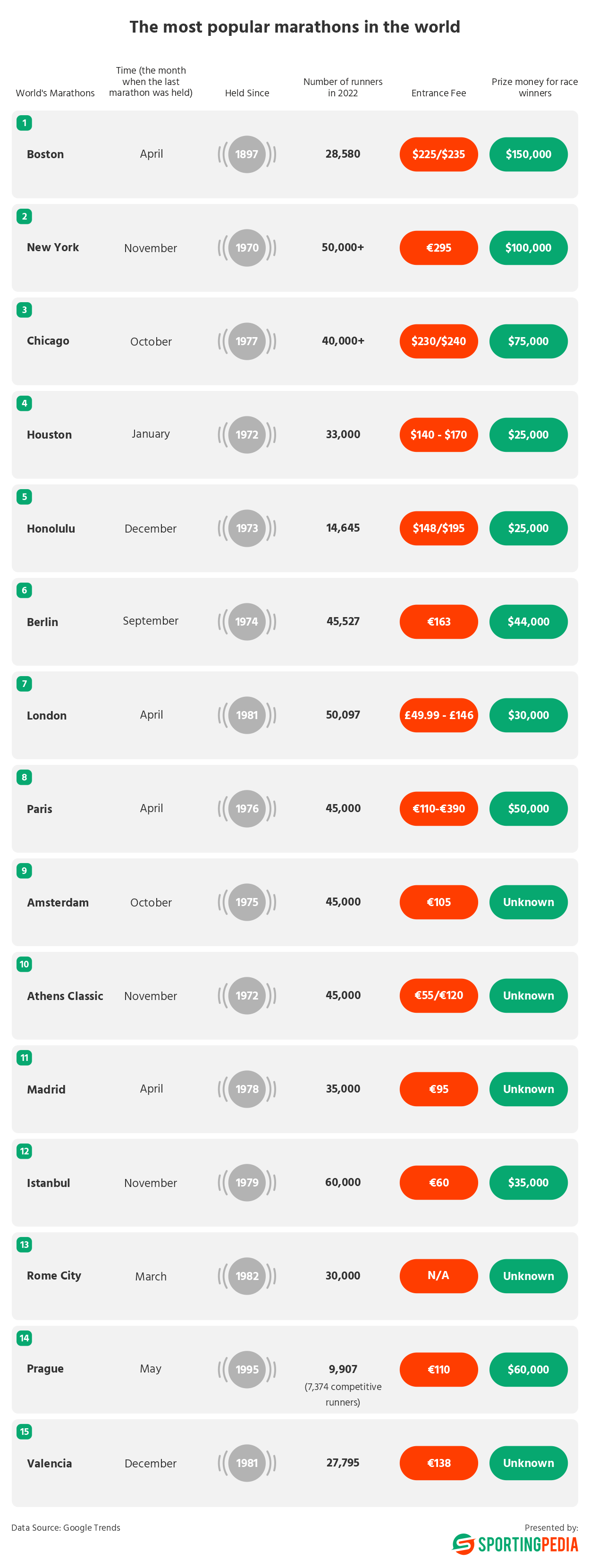Running a Marathon is a one-of-a-kind experience – challenging, painful, and rewarding at the same time, but not reserved for professional athletes only. Unlike other prestigious sports events such as the Olympics, Marathons are open both to elite runners and to the masses. Many of these races take place in the Spring, attracting international audiences and participants from all over the World. The team at SportingPedia decided to compile a list of the world’s top 15 Marathons based on the number of participants, prize money for race winners and Google search popularity.
For this list, we looked at some of the oldest and most prestigious events, including the Athens Classic Marathon, the successor to the original Marathon that once occurred in Ancient Greece. We took the size of the race and the elite field into account, which is why we included the Abbott World Marathon Majors – the only exception being Tokyo, the youngest of the Marathons. The overall popularity of the event was also a key factor in putting together this list, so we analyzed Google searches in order to find out which are the most searched Marathons on the Internet.




What Is So Special About Marathons?
The Marathon is a foot race over a distance of exactly 42.195 km (26 mi 385 yd) and it is accessible both to professional and recreational runners, as long as they are over the age of 18 – although some races accept participants as young as 12. The race was inspired by the legend of the Greek messenger Philippides who, during the Battle of Marathon in 490 B.C., ran from the hills of Marathon to Athens to announce the Greek victory over the larger Persian army. According to the legend, the poor messenger discarded his clothes and weapons so he could run faster, and once he delivered the news, he collapsed and died.
Currently, the Olympic men’s record is 2:06:32, set at the 2008 Summer Olympics by Samuel Kamau Wanjiru of Kenya, while the women’s record, set in 2012, is held by Tiki Gelana from Ethiopian – 2:23:07. As for World records, the fastest Marathon runners are Kenyan – Eliud Kipchoge, who managed to run the 2022 Berlin Marathon from start to finish in 2:01:09, and Brigid Kosgei, who achieved 2:14:04 at the Chicago Marathon in 2019. Kipchoge is the only person who has run a Marathon in under two hours. On 12 October 2019, he achieved 1:59:40.2 at a special event designed for him in Vienna.
The World Marathon Majors series includes the Marathons of Boston, Chicago, Berlin, London, New York City and Tokyo.
New York City Marathon
The New York City Marathon is known as the largest marathon in the world – in 2019, a record 53,627 people finished the race, which crosses all five boroughs of the city. Roughly 2 million spectators line the course, cheering the competitors on. The marathon is so popular that participation is decided through a lottery system – obviously, this rule does not apply to elite runners. The event was first held in 1970 has been cancelled only twice – in 2012, following Hurricane Sandy, and in 2020 due to the Covid-19 pandemic.
London Marathon
Just like the NYC Marathon, the London Marathon is part of the World Marathon Majors competition and just like the U.S. race, it is extremely popular. In 2019, 414,168 people applied for entry through the Marathon Ballot – of course, only a fraction of them were accepted (56,398) and even fewer actually ran in the race (42,906). The course is mostly flat and it is set along the River Thames – it starts in Blackheath, crosses Tower Bridge, passes close to The Tower of London, and in the final yards, runners can enjoy the sights of Big Ben and Buckingham Palace.
Berlin Marathon
The Berlin Marathon has been held annually since 1974 and for the first 16 years, its course was restricted to West Berlin. This changed in 1990, when the Marathon was held just three days before the official reunification of Germany – on 30 September, roughly 23,000 people ran through the Brandenburg Gate. Now, the course (which is extremely flat) passes through the former West and East parts of the city and has become known as the fastest Marathon course in the world. Since the 1990s, the event has hosted multiple World records, including the current record for the fastest Marathon run of all times – 2:01:09, set in 2022 by Kenyan running sensation Eliud Kipchoge.
Paris Marathon
The Paris Marathon is a picturesque race, passing through iconic areas and buildings in the heart of the city. Participants start on the Avenue des Champs-Élysées, circle around the Place de la Concorde, reach the Bois de Vincennes, and then head back through the city along the River Seine before finishing on Avenue Foch. This is also one of the largest Marathon events in the world – this year, it welcomed 52,078 participants, 51,100 of whom finished the race. According to organizers, 43 per cent of all runners were first-timers.
Boston Marathon
Established in 1897, the Boston Marathon is the oldest annual Marathon in the World, and has been held every year, even during World War I & II and the Great Depression. The only exception was in 2020, when it was cancelled due to the Covid-19 pandemic. The first event was organized on April 19, 1897, Patriot’s Day, a holiday commemorating the start of the Revolutionary War. The Marathon attracted just 18 participants, and was won by John J. McDermott of New York, who ran the 24.5-mile course in 2:55:10 and allegedly lost ten pounds (4.5 kg) over the course of the race. These days, the Boston Marathon attracts around 30,000 participants each year and is considered one of the most prestigious Marathon races in the World.
Chicago Marathon
One of the World Marathon Majors, the Chicago Marathon, attracts thousands of participants every October. It is particularly popular among elite athletes who come here to pursue personal as well as World records since the course is mostly flat, and very fast. In fact, since the first event in 1977, five World records have been set here, including the current women’s World record of 2:14:04 set by Kenyan runner Brigid Kosgei in 2019. Despite its participant cap of 45,000 runners, thousands more apply each year, so apart from the guaranteed entry for elite runners, a lottery system is used.
Houston Marathon
The first Houston Marathon was held in 1972. Just 113 runners took part in the 5-mile race, while roughly 200 spectators came to witness the event. Participants were served beef stew after the competition. Since then, things have changed – the course was adjusted to meet the Marathon standard of 42,195 km, the number of participants has grow to tens of thousands, and the crowd gathering around the race is now roughly half a million people. No stew is served, however, and it is more common to replenish your energy reserves during long-distance runs with energy drinks and protein bars.
Amsterdam Marathon
With a flat course and a maximum elevation of only 33ft at the 23rd mile, the Amsterdam Marathon is one of the fastest road races in the world. The start and finish are at the Olympic Stadium, and the course runs along the Amstel River, past several windmills, and through the breathtaking tunnel of the Rijksmuseum. Up to 45,000 runners can register each year for the Marathon, the half Marathon, and the 8K race.
Honolulu Marathon
Far from being the largest Marathon in the world, the annual Honolulu Marathon is one of the most unique running competitions in the world. The Hawaiian destination makes it widely popular among first-timers and tourists, especially among visitors from Japan. Yet, the Marathon is fairly difficult due to the hilly course and the hot weather in December. Unlike most Marathons, there is no cut-off time, which is typically around the 6th or 7th hour, so everyone can finish and receive a medal.
Athens Classic Marathon
This list would not be complete without the race that inspired the world to run marathons in the first place. In its modern form, the Athens Classic Marathon – The Authentic, has been held annually since 1972 and has grown into one of the most prestigious Marathons in the world. The course starts from the town of Marathon, goes uphill and downhill, enters Athens and finishes at the historic Panathenaic Stadium. It more or less replicates the original route chosen by Philippides to deliver the news about the Greek victory over the Persians, and is considered to be the most difficult Marathon course in the world.
